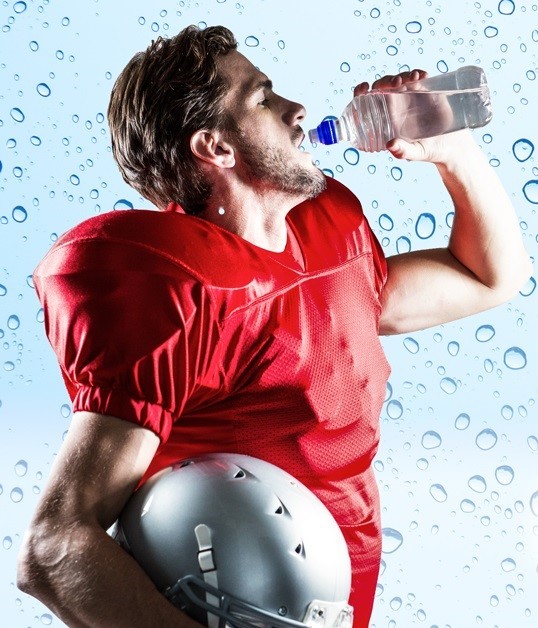
By John R. Mishock, PT, DPT, DC,
Owner, Mishock Physical Therapy & Associates
Each year there are numerous deaths of youth and adolescent athletes connected to dehydration related illness, while playing sports, especially pre-season football camps. There was a time when drinking water during practices and games was seen by coaches as a weakness or lack of mental toughness. However, mental toughness cannot usurp the physiological needs of the body. The fact that the body is made up 60% water, and the brain 85%, makes water an essential nutrient for bodily function. Without adequate hydration, sports performance will be negatively affected, and serious illness, or death, can occur.
When the body is loses as little as 3%water during sweating, heat stroke can occur. There are three stages of heat related illness. The first phase is heat cramps; muscle or stomach cramps, and dry mouth. This is followed by heat exhaustion; dizziness, light-headiness, nausea, vomiting, and rapid heartbeat. The final phase is heat stroke; high body temperature, confusion, seizure, and loss of consciousness. Unless acted upon quickly, heat stroke can lead to death. If the athlete is experiencing heat stroke, it is essential to seek medical help ASAP, call 911. Not only can serious illness be prevented with proper hydration, but sports performance can be enhanced.
The risk factors for dehydration are:
*Wearing heavy, dark clothing or protective gear that contributes to excessive heat retention.
(Wear light colored clothing and reduce gear if possible.)
* Individuals who rarely exercise and have poor physical condition.
* Individuals who are overweight or obese.
* Individuals who are sick, or have had a recent illness involving diarrhea, vomiting, or fever.
* Individuals taking certain supplements or medication, such as cold medicine.
* Individuals who are not well-rested.
Being well hydrated helps to optimize sports performance. Mild dehydration, as little as 1-2% loss of body weight, with sweating, can result in poor athletic performance, reducing physical capabilities and performance by 6-10%.
Keep in mind that thirst is not a good measure of water needs. By time you are thirsty, it is too late to combat the physical changes of dehydration. One way to determine hydration needs is by the color of the urine. Dark urine is a sign of dehydration. The urine should be colorless in a well hydrated athlete.
How to hydrate properly prior to exercise and sports:
* 2-3 hours before exercise or competition drink 20 oz. of water (no caffeine, as this dehydrates).
* 30 min before exercise or competition drink 8 oz. of water.
* Every 20 minutes during exercise or competition drink 8 oz. of water
* 20 min after exercise or competition drink 8 oz.
* If you exercise greater than 1 hour drink 8-12 oz. of a sport drink to replace electrolytes.
* Monitor urine for signs of dehydration.
We can help!
Reduce pain and increase function
Call for a FREE Phone Consultation at (610)327-2600.
Locations: Gilbertsville, Skippack, Phoenixville, Steiner Medical, Boyertown, Pottstown, and Limerick (inside the Spring Valley YMCA).
Appointments available 7:00am to 8:00pm, ALL locations, most days!
Saturday Appointments Available
Visit our website to request an appointment, read informative articles, meet our physical therapy staff, and learn about our treatment philosophy.
Dr. Mishock is one of only a few clinicians with doctorate level degrees in both physical therapy and chiropractic in the state of Pennsylvania.
